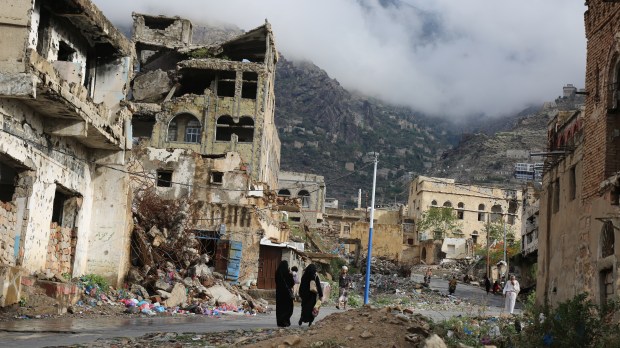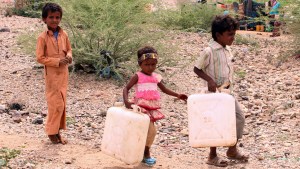Tomasz Kania, who has been stationed in Yemen for almost a year as the head of Caritas Poland’s operations there, knows that the country is one of the poorest on earth. And yet, he reports, a high number of Yemenis dine out in restaurants. What explains this apparent anomaly?
“You would think it’s cheaper to cook and eat at home,” Kania said in a recent interview. “But in order to cook at home, you need to have a refrigerator,” to store provisions and leftovers. In a country that struggles to provide citizens with a steady flow of electricity – four hours on, up to seven hours off – it’s impractical to have a refrigerator, and with severe shortages in fuel to run generators, it’s even harder.
If only that were the worst of Yemen’s problems.
The country, at the southern end of the Arabian peninsula, is “in shreds” after years of war, Kania said.
According to Wikipedia, Yemen has been in a state of political crisis starting with street protests against poverty, unemployment, and corruption in 2011, and former President Ali Abdullah Saleh’s plan to amend Yemen’s constitution and eliminate the presidential term limit. Saleh stepped down and the powers of the presidency were transferred to Abdrabbuh Mansur Hadi. Since then, the country has been in a civil war (alongside the Saudi Arabian-led military intervention aimed at restoring Hadi’s government) with several proto-state entities claiming to govern Yemen. The war has resulted in a famine affecting 17 million people. The lack of safe drinking water, caused by depleted aquifers and the destruction of the country’s water infrastructure, has also caused the largest, fastest-spreading cholera outbreak in modern history, with close to a million suspected cases. Over 2,226 people have died since the outbreak began to spread rapidly at the end of April 2017.
More than seven years of armed conflict in Yemen have caused tens of thousands of civilian casualties and displaced over 4 million people, according to the UN’s Humanitarian Needs Overview for Yemen.
“All the years of the conflict have caused immense destruction to the country, basically every aspect: economy, production, education, health services,” Caritas Poland’s Kania said. “The latest stats from Humanitarian Needs Overview for Yemen says that only 50% of health facilities are working.”
Ceasefire leads to humanitarian corridors
Humanitarian groups are hopeful that a ceasefire implemented in Yemen in early April will hold and will lead to better conditions.
“I would hope that this ceasefire bears fruit,” Julie Whittaker, deputy head of programming at Catholic Relief Services, said in April. The World Food Programme, she said, has reported that the ceasefire has allowed for increased humanitarian access.
Kania said that prior to the ceasefire, communication was impossible between warring areas of south and north. “There is no way for any goods to cross the front line, for example, things for commercial use and drugs,” he said. “So announcing the ceasefire made those kinds of contacts possible. Also, because of the ceasefire, various agreements were made, for example, for the supplying of much needed fuel. Apart from the very high price of fuel, which was available in [the southern port city of] Aden, the north of the country has very big problems with fuel supply. So the ceasefire enabled different ships to enter the port city of Al-Hudayda with oil, which allowed hospitals to begin operating again.”
Health facilities, like everyone else, rely on gas-powered generators during the frequent and regular shutdowns of state electricity supplies, he explained.
That’s important because almost 65% of Yemenis – about 20 million people – need urgent access to health related services and health support, Kania said.
“From the perspective of humanitarian access, even where humanitarian organizations can get to hard to reach areas, for example, villages on the front lines, silencing the guns was really important,” he added.
The Ukraine Effect
With war raging in Ukraine, Yemen is one of several conflicts and humanitarian crises that have largely dropped off the front page of newspapers, along with Ethiopia, South Sudan and Myanmar. Russia’s invasion of Ukraine has also led to major problems in the flow of fuel, grain and fertilizers, heightening food insecurity in many parts of the world.
Even before Russia’s February 2022 invasion of Ukraine, the fuel situation in Yemen was bad.
“Fuel prices between 2015 and 2020 skyrocketed – about a 300% increase in the cost on the black market,” CRS’s Whittaker noted. “We are seeing further spikes in prices and related shortages.”
Yemen traditionally has imported 90% of its food and critical supplies, Whittaker said. Much of its wheat and cereals previously came from Ukraine and Russia. Now, the war in Eastern Europe is making matters much worse. “Over 80% of Yemeni people are dependent on humanitarian aid, just to make ends meet,” she said. “The situation of starvation is widespread. Half of the children under five in Yemen are at risk of severe malnutrition.”
On Tuesday, Ukraine’s President Volodymyr Zelenskyy said that trade at the country’s ports was at a standstill and urged the international community to take immediate steps to end a Russian blockade to allow wheat shipments and prevent a global food crisis, Reuters reported.
Hope for Yemen
Aid agencies are not giving up on Yemen, however, and CRS’s Whittaker focuses on individual Yemenis whose hopeful spirit cuts through the darkness of war and suffering.
“One of the women we’ve supported who’s gone through one of our partner training programs worked as a physician’s assistant in one of the public hospitals,” Whittaker said. “She inspired me because, working long, long hours, and she herself living in this very difficult environment, she said the ability to support families, mothers who are with children on the brink of starvation, and able to offer them the critical healthcare they need to be revitalizing the child, to be able to stabilize that dire case is a motivation that carries her through the long days and nights.”
And the Vatican has not forgotten this part of the world either. Pope Francis recently appointed Bishop Paolo Martinelli, OFM Cap., as vicar apostolic of Southern Arabia, a jurisdiction covering Yemen, Oman and the United Arab Emirates. In a Vatican News interview last week, Bishop Martinelli spoke about the ongoing war in Yemen and highlighted the need to work at the grassroots level as well as the diplomatic level by building a culture of encounter from below.
“We need to break the mold and self-nurturing interests, but there is also a need to encourage meaningful encounters at the grassroots level; to make people understand how different cultures can confront each other despite tensions, precisely by focusing on the common good.”
Whittaker said that CRS’ partners in Yemen are doing just that.
“In one program, CRS’ partner, Education for Employment brings conflict-affected youth together in a job training and placement program for the medical field,” she said. “These young men and women work together to improve their skills while also collaborating on community service projects.”
Significantly, some of those projects are answering the very health crisis Yemen has been facing. “Youth have come together to lead health awareness campaigns and provide basic health consultations for underserved communities,” Whittaker said. “After the program, youth go on to jobs in the medical field, filling critical roles as health staff in Yemen’s overstretched medical facilities and continuing their leadership in community service.”



